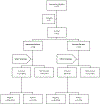Follow-up approaches to a health literacy intervention to increase colorectal cancer screening in rural community clinics: A randomized controlled trial
- PMID: 31355924
- PMCID: PMC6763382
- DOI: 10.1002/cncr.32398
Follow-up approaches to a health literacy intervention to increase colorectal cancer screening in rural community clinics: A randomized controlled trial
Abstract
Background: Significant disparities exist in colorectal cancer (CRC) screening rates among those of low socioeconomic status, with fewer years of education, lacking health insurance, or living in rural areas.
Methods: A randomized controlled trial was conducted to compare the effectiveness of 2 follow-up approaches to a health literacy intervention to improve CRC screening: automated telephone call or personal call. Patients aged 50 to 75 years residing in 4 rural community clinics in Louisiana were given a structured interview that assessed demographic, health literacy and CRC screening barriers, knowledge, and attitudes. All were given health literacy-informed CRC education, a patient-friendly CRC screening pamphlet, simplified fecal immunochemical test (FIT) instructions, and a FIT kit, and a "teach-back" method was used to confirm understanding. Patients were randomized to 1 of 2 telephone follow-up arms. If they did not mail their FIT kit within 4 weeks, they received a reminder call and were called again at 8 weeks if the test still was not received.
Results: A total of 620 patients were enrolled. Approximately 55% were female, 66% were African American, and 40% had limited literacy. The overall FIT completion rate was 68%: 69.2% in the automated telephone call arm and 67% in the personal call arm. Greater than one-half of the patients (range, 58%-60%) returned the FIT kit without receiving a telephone call. There was no difference noted with regard to the effectiveness of the follow-up calls; each increased the return rate by 9%.
Conclusions: Providing FIT kits and literacy-appropriate education at regularly scheduled clinic visits with a follow-up telephone call when needed was found to increase CRC screening among low-income, rural patients. The lower cost automated call was just as effective as the personal call.
Keywords: colorectal cancer screening; disparities; health literacy; prevention; randomized controlled trial; rural community clinics.
© 2019 American Cancer Society.
Conflict of interest statement
No conflicts are noted by the authors related to the work described.
Figures
Comment in
-
Moving from theory to practice: A call to action on cancer disparities.Cancer. 2019 Oct 15;125(20):3504-3505. doi: 10.1002/cncr.32419. Epub 2019 Jul 29. Cancer. 2019. PMID: 31355914 No abstract available.
References
-
- Cancer Facts and Statistics. American Cancer Society. Cancer.org. https://www.cancer.org/research/cancer-facts-statistics.html. Accessed July 8, 2018.
-
- Final Recommendation Statement: Colorectal Cancer: Screening. US Preventive Services Task Force. Uspreventiveservicestaskforce.org. https://www.uspreventiveservicestaskforce.org/Page/Document/Recommendati.... Accessed June 30 2018.
-
- National Health Interview Survey (NHIS). CDC/NCHS Healthy People 2020. https://www.healthypeople.gov/2020/data-search/Search-the-Data#objid=4054 Accessed August 8, 2018.
-
- Centers for Disease Control and Prevention (CDC). Behavioral Risk Factor Surveillance System Survey Data. Atlanta, Georgia: U.S. Department of Health and Human Services, Centers for Disease Control and Prevention, [2012, 2014, 2016].
Publication types
MeSH terms
Grants and funding
LinkOut - more resources
Full Text Sources
Medical
Miscellaneous



